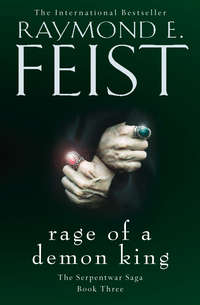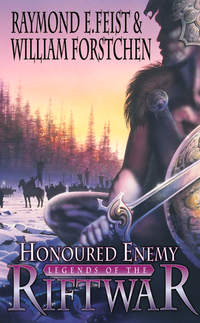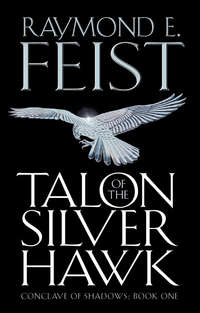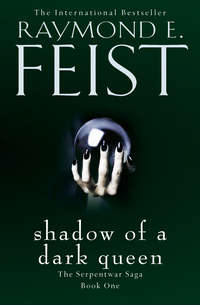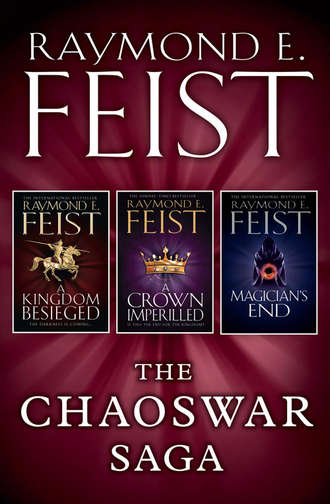
Полная версия
The Chaoswar Saga: A Kingdom Besieged, A Crown Imperilled, Magician’s End
That worried Martin more than anything else. They would have to assume that the moment they were spotted, the call for reinforcements would go out and reinforcements would be on their way. Why weren’t they in a hurry?
The day wore on and those in the castle watched in fascination. The fortification on the eastern edge of the town was quickly made secure, and at sunset a daunting wall rose up that had been bolstered with sandbags brought up from the shore. Now there was a six-foot breastwork with a firing platform behind, where archers could fire upon anyone venturing from the castle.
‘If we had sortied this morning …’ Martin clenched his fists, the frustration of not knowing what the enemy’s next move would be taking its toll.
‘We would have run into who knows what, sir,’ finished the sergeant. ‘We can only see that lot. Who knows how many more soldiers they have unloaded down by the docks, or still waiting aboard ship? They don’t seem worried about us.’
‘Which is why I am concerned,’ countered Martin. ‘It’s as if—’
‘Sir!’ came the shout. ‘A white flag!’
Martin looked in the indicated direction and saw what must be a Keshian officer approaching under a flag of truce. He came up to the gate and looked up at the faces there. ‘I seek parley!’ he shouted. ‘Who is in charge here?’
‘I am!’ Martin shouted back. ‘I am Martin conDoin …’ He hesitated, then added, ‘Prince Martin of Crydee.’ He was entitled to the honorific, though no one in his family had used it since Prince Arutha had left Crydee to take up the office of Prince of Krondor. His brother, Martin’s namesake, had insisted only the title of duke be conferred upon him, a tradition followed for three generations after.
‘Greetings, Highness,’ replied the officer. ‘I am Hartun Gorves, Captain of the Fourth Legion, Third Regiment, servant of His Most Honoured Majesty, the Emperor of Great Kesh, blessings be upon him. My lord and master bids you depart this land, peacefully, and safe conduct to the East will be guaranteed. He reminds you these lands are Keshian, ancient Bosania, taken from the Empire most violently and without cause by your ancestor.
‘He bids you depart and swears that he will treat harshly any of his servants who would trouble you. Take with you your possessions and goods, livestock and chattels, but begone at once, otherwise I am instructed to deal with you in the most severe manner.’
Martin stood uncertain for a long moment. Of all the things he had expected to hear, the simple demand that he and everyone in the duchy pick up and move wasn’t one of them. That Kesh meant to occupy this land was now beyond doubt: this was no simple raiding expedition, for booty or political gain; they sought to reclaim land that had not been part of the Empire in over two centuries, yet were treating the Kingdom’s expansion as if it had occurred but a few weeks prior.
At last Martin said, ‘You’re joking.’
The officer bowed. ‘Most assuredly not, fair prince. I and two of my officers would be willing hostages in your travels. Once you reach the borders of the land called Yabon, we will leave your company, and you may deal with the garrison there.’
‘Garrison?’ shouted Ruther. ‘What does that mean?’
‘By the time you reach Yabon, it will once again be Keshian, as will the so-called Free Cities and that abomination known as Queg. The garrison at Yabon will escort you to the border at Questor’s View and then on to Krondor. From there you will be free to continue on to the borders of the Kingdom and cross without harassment.’
‘Borders of the Kingdom!’ echoed the sergeant furiously. Martin put his hand on his arm and the old soldier fell silent.
‘And where is this border?’ asked Martin.
‘Darkmoor. That was your traditional frontier and that is where it is again, for all lands west of there are now Keshian. Once you reach Darkmoor, you will once more be on Kingdom soil. The Empire is reclaiming its realm, from Crydee to Krondor, Yabon and LaMut. Even as we speak the armies of Great Kesh are marching and our navies are sweeping through the Bitter Sea. You are now trespassing on Keshian soil, my prince,’ declared Captain Gorves. ‘You have two days to make ready for your departure or I shall bring horrors upon you and your people that no man should have to contemplate. It is a simple choice; leave or die.’
With that he turned and walked away, leaving a stunned Martin unable to speak.
• CHAPTER TWELVE •
Escape
JIM DASHER RAN.
Four armed men were following him and his guide, and he knew that if they were overtaken, he was certainly a dead man. Whoever was hunting him had proved to be relentless. They were dashing through the alleys and streets of Ranom, a miserable little trading port at the foot of the Trollhome Mountains in Western Kesh. The plan had been to get to a ship waiting in the harbour, and then sail to Durbin, as close to the border as a Keshian freighter could travel. Getting from Durbin to the Kingdom’s closest city, Land’s End, was Jim’s problem. Jim silently cursed Kaseem’s agent aboard the ship where he was captured; instead of merely removing the Tsurani transportation orb that Jim had hidden, he had prodded it with a dagger point, thinking it some sort of tiny multi-levered-lock box and his meddling had rendered it inoperable. Now the only way back to behind the Kingdom’s lines was by his own wits.
His guide made a motion with his head, indicating a turn to the left, and they both darted down an alleyway. The guide suddenly leapt for a low overhanging roof and by the time Jim could follow his lead, was hanging from roof beams in deep shadows under the roof’s eaves, just a foot above a tall man’s head. Jim knew exactly what was being said without words. They couldn’t outrun the assassins, so their only choice was to get behind them.
A moment later the four men came down the street, and not for the first time Jim was disturbed by how silently they moved. These were men who resembled the legendary Nighthawks, a cult of demon-worshipping assassins detailed in memoirs by his great-great grandfather, James, the first Jamison, the legendary Jimmy the Hand of the Mockers.
There was a rueful sense of fate that visited Jim as he clung precariously to the eaves, waiting for his pursuers to run underneath him.
As a boy his father, the second James, had raised him to be a servant of the Crown, as he was, but his Uncle Dasher, after whom he was also named, and Great Uncle Dashel, used to regale the young Jim with stories of his namesake, the first James. As a child Jim had insisted for a time on being called ‘Jimmyhand’, and the moniker had stuck. More than once he had employed it to good use, in his guise as Jim Dasher, simple thief and pickpocket in the Mockers. But more than once he had also decided that somewhere along the way he had got caught up in his own myth, and that without realizing it, he was competing with the ghost of a dead forebear. But, good gods, Nighthawks?
If they were indeed a resurgence of that long-believed-dead clan of murderers, things were even more dire than he thought. It was believed the Nighthawks had finally been obliterated by Eric von Darkmoor’s special attack unit, The Prince’s Own, in the long-abandoned Cavell Keep, some ten years ago. Silently, Jim thought of them as cockroaches: you thought you’d killed them all, but they kept showing up.
The same thought had passed through his mind after seeing the Pantathian Serpent Priest in that longboat. Every report he had read indicated they had been obliterated years ago and the birthing crèche in their underground lair in Novindus destroyed. Another nest of cockroaches, apparently.
The pursuers ran quietly underneath, and Jim held his breath, praying they would not notice they were passing scant inches below their quarry, or they would be able simply to impale him and his companion as easily as spearing fruit on a tree branch with a pointed stick. Jim felt more than heard his companion let himself lightly down to the ground. Jim followed, his shoulders and hips burning from the exertion of holding himself in place. I am getting too old for this nonsense, he thought. His father and grandfather were both putting pressure on him to marry and start a more mundane life in the King’s service and he was getting to be convinced that was a really fine idea. Not for the first time he considered asking Franciezka to quit her post with the Crown of Roldem and run off to some tiny island where they could eat, sleep, and make love.
The guide motioned and Jim followed, running silently through the dark streets of the city. Ducking through a maze of alleys, they reached an unmarked door, and the guide opened it.
Jim followed him inside without hesitation and closed the door behind him. ‘We shall be safe here,’ said the guide.
‘Not for long.’
‘Yes, they will double back, but unless they can track by magic, they’ll have a hundred doors to investigate.’ He caught his breath and added, ‘The sun will rise in an hour. We can attempt to get down to the docks in the throng going to work. Rest now. I will go and seek help to get you out of the port. If I am not back by dawn, it means I have been captured or am dead; make your way to the docks as best you can and seek out a boat called the Mialaba, the name of a woman from the captain’s homeland. He is a man named Nefu. He can be trusted. Tell him you need to find a ship for Durbin and he will get you safely there. Latch the door behind me.’
Jim waved a tired hand, indicating that he understood, and the guide slipped out of the door. Jim latched it and sat down heavily on a large, tied bundle of cloth.
When he looked around, he saw he was in the back room of some sort of enterprise, a tailor’s shop by the look of it. Whoever owned it was absent, and Jim was certain the shop must be one of Kaseem’s safe houses in this town.
He settled in, determined to sort through the strange events he’d endured since awakening in Ranom. For several hours, Kaseem abu Hazara-Khan had detailed to Jim what had occurred in his nation to bring this war on so suddenly and unexpectedly.
It had begun, according to the desert man, with the unexpected rise in the Gallery of Lords and Masters of a few members of the nobility who were close friends with a Keshian prince by the name of Harfum, a distant nephew of the Emperor. This sort of nepotism and cronyism was nothing new in the Empire, and as long as it didn’t get too obvious and abusive, no one cared about it. The only thing Keshian nobility cared about was keeping their own rank and privileges. The offices granted these men were minor: supervising taxes in a distant province, overseeing the garrisons along the southern border with the Confederacy, supervising the building of ships, levying duties on goods transported by caravan. Nothing in these appointments signalled building a power base or creating a faction within the Gallery of Lords and Masters, so no one objected.
Then came rumours about a caravan carrying certain goods being diverted at the request of the newly-appointed minister for that district, or a ship-building request that seemed to originate in some vague office attached to the Imperial Navy, but with no one quite sure who was authorizing that purchase. It seemed that Prince Harfum’s friends were always somewhere around when things turned odd, but Kaseem could not establish a clear pattern or find compelling evidence to present to his master, the Imperial Chancellor, or to the Emperor himself.
Also the corruption that was common to Kesh’s bureaucracy hid much of what was going on, since bribes were paid for falsified cargo manifests and caravan freight was signed off without inspection. Bolts of cloth turned out to have sharp, hard edges; urns were filled with herbs that had steel broad-heads attached, and pottery was made from steel with nose- and cheek-guards. Bows were smuggled as trade goods; swords, shields and armour as raw timber. Iron ore intended for the Imperial Armoury at one city was diverted to a retired swordmaker’s forge in a different city. When a hundred horses were requisitioned for a garrison, eighty would arrive and a notation on a document would explain away the discrepancy. Mules, oxen, horses, dried foodstuff, crates for food, water barrels and casks – all the necessities to put an army on the march – slowly wended their way through the Empire, always heading south. And it had been going on for more than two years, before the spymaster of Kesh even had an inkling.
By the time Kaseem had sensed something was amiss, it was too late. His agents began to vanish, or mysteriously file reports that made little sense at the time, and when Kaseem realized his network of intelligence operatives had been compromised, it was much too late.
As Kaseem had made ready to leave the City of Kesh to investigate what he feared to be the case – high treason running rampant in the government – the attacks had begun. The first attempt had been by one of his most trusted agents, the man he had put in charge of the entire network in the City of Kesh and the surrounding region of the Overn Deep. That meant he could trust no one in the City of Kesh. Three times armed men had almost killed Kaseem as he made his escape, but he wasn’t considered the wiliest man in Great Kesh without reason.
Kaseem had taken a fast horse and headed west towards Caralyan rather than north to his home in the Jal-Pur. Every road from the City of Kesh directly leading to the Jal-Pur would be watched by those trying to kill him, so his intention had been to sail around into the Bitter Sea, then to the port of Ranom. From here he would ride to his father’s camp, at one of many desert oases, where he knew he would be safe.
It was only by the strangest chance that one of the agents Kaseem had detailed to watch for Kingdom spies had noticed Jim. He had contrived to join the same ship’s company as a common sailor set to keep an eye on Jim. That ‘sailor’ was now Jim’s guide here in Ranom; he was named Destan and was a man Jim would have been happy to have in his service. Jim was very good at not being noticed when he so chose, so the fact that Destan had spotted something to make him suspicious must make him a very valuable asset to Kaseem.
Destan had been detailed to Hansulé to keep an eye on the insanity of mobilization that had gripped the Empire, to ascertain where all the arms and supplies were heading for so it was, for him, a happy coincidence that Jim was signing on as a sailor on the same fleet. When he caught sight of Jim checking a lump in his hammock, he had managed to ferret out the tiny Tsurani sphere. But then he had prodded at it with a dagger, trying to open it, and had only succeeded in breaking it. But that was of secondary importance; at that point he knew that Jim was someone his master would most certainly wish to speak to.
When Jim had tried to escape, Destan had struck him from behind, an effective enough means to render him docile, and carried him up on deck while everyone else was busy. Since he had Jim wrapped in canvas, he looked like just another sailor moving something important from one place to another. He had dumped Jim in a sail-locker and came back half an hour later to drug him.
Jim had awakened here in Ranom. He was uncertain how he had got there from Caralyan so fast, but decided that Kaseem must have his own supply of Tsurani devices, or some other magical equivalent, a magician in his service who could transport others as Magnus could, perhaps. When Jim had broached the subject, Kaseem had been noncommittal: if he possessed such a device, he wasn’t offering one to Jim Dasher to get back to the Kingdom.
Kaseem had problems of his own, it was fair to see, and Jim was touched by his willingness to help one of his most dangerous opponents. For a brief instant he considered it ironic that Francezka and Kaseem were the two people most likely to have him killed, ultimately, yet in them he had found kindred souls. Not for the first time he considered he had chosen a very strange trade in life.
In the hours during which Kaseem abu Hazara-Khan had told Jim his tale a pattern had emerged, but he had remained silent and kept listening. Kaseem had explained in detail how his own network of agents had been compromised from within, as well as effectively countered and blunted by outside forces. He admitted that he had spent so much of his time watching the kingdoms of the Isles and Roldem or the Southern Confederacy that he had neglected his own nation’s internal politics, assuming that the traditional Keshian blood sport known as ‘government’ would continue as it had over the centuries.
Someone had taken advantage of that; and from the scope of the betrayal, Kaseem was certain this usurpation of his network had been underway for perhaps as long as five years.
Jim’s first question was to consider who would benefit from a massive war between the Kingdom and Kesh. Logically, no one. He had become enough of a pragmatist that he conceded a little criminal activity was inevitable, though he had tried to keep his Mockers from cutting too many throats, and then only those who more or less deserved it; he believed there would always be some military adventure, but that it needed to be kept in check because the Kingdom had other enemies to confront; but Kesh had no Brotherhood of the Dark Path and their goblin allies on their northern border, and a rapidly-growing city of odd, very powerful elves who did not appear to be particularly friendly.
The Eastern Kingdoms were closer to the Isles than Kesh, and there had constantly been border squabbles since the Isles had once been just one of a group of petty kingdoms in the Sea of Kingdoms. So it was the Isles that kept a fractious group of neighbours in check; though Roldem’s presence in Olasko lately had stabilized things to a point at which reports from Jim’s agents in Miskalon, Salmater and Far Lorin were rendered mundane to the point of tedium.
On the whole, Jim considered war a waste of resources, especially human ability and talent, and tried to keep the Kingdom out of them. War represented a failure of intelligence and diplomacy, and caused far more trouble than it solved.
There were just wars; the Tsurani invasion over a century before and the invasion of the Emerald Queen’s army in his grandfather’s time had both been defensive wars that had to be waged to the last drop of blood.
But this …?
As far as Jim could tell, this was a needless launching of the most massive war seen on Midkemia since the onslaught of the Emerald Queen’s army, and that war had devastated an entire continent and brought ruin to half of the Kingdom. It had been the last time Kesh had sought to move against the Kingdom, seeing it weak and vulnerable after the destruction of Krondor.
But since the magician Pug had forced both sides to peace. …
Pug? Jim sighed. He had a difficult relationship with the magician and his Conclave of Shadows, but at least Pug was trustworthy. And by dint of his being the adoptive father of Jim’s great-great-grandmother, a distant relative.
Something on this scale needed to be discussed with Pug. But given where Jim currently sat, his ability to reach Sorcerer’s Isle was somewhat problematic, being far to the north-east and in the middle of what was likely to be a war zone involving three navies: Kesh, the Kingdom, and the Kingdom of Queg. One more time he silently cursed Destan for disabling the orb; one of the previously established destinations in that device had been Pug’s island. Now not only was he forced to remove himself from what was verging on becoming a death trap, he had to find his way to an even more difficult destination.
He debated several choices, including stealing a horse and making the ride to Durbin. The majority of arms and men would be moving by sea, but that didn’t preclude overland units making their way to support the garrison at Shamata and a single rider on a dusty road across an arid desert would certainly bring attention.
No, his best choice was by sea. If his guide didn’t appear soon, Jim would find the Mialaba and the man named Nefu.
Time passed slowly, and Destan didn’t return. Finally Jim saw light beneath the door and heard enough street noise to conclude that morning was upon him.
He opened the door cautiously and peered out. In the street just beyond the alley he could see men and women hurrying along as the work day started. Like Durbin, this hot-weather city’s business started early, eased off during the hottest part of the day, then resumed in the late afternoon and continued deep into the evening. This would be Jim’s best opportunity to get to the docks and find Nefu.
He considered his appearance. He was still wearing his sailor’s garb and knew he would be instantly recognized if any of the men who had chased him caught a glimpse. He stepped back inside and closed the door. The tailor’s shop would soon be visited by its owner and workers, no doubt, so he had best come up with whatever disguise he could cobble together as quickly as possible.
He opened the door opposite the one leading to the alley and found a room in which clients were probably greeted and where the cutting and sewing was done. Half a dozen garments were on display and one caught Jim’s eye. It was a robe, the sort preferred by the desert tribes of the Jal-Pur, worn open in front, which could be closed and secured with a large sash, and a matching cloth head cover. Jim had spent enough time in the desert to know that punishing cold nights and stinging sand storms required a well-made covering. This had the look of a merchant’s robes, but not robes a wealthy merchant would wear. If this garment was ready for a client who had paid in advance, its disappearance would quickly be noticed. If it was stock ready to be bought by someone who happened by, perhaps not as soon. He checked swiftly through the other garments and discarded them as not being useful and then made a decision.
He removed his shirt, a simple white linen top with an open collar and quarter-length sleeves, and chose a more finely-fashioned red shirt which would go nicely with the deep indigo of the robe. The grey flannel trousers he wore would have to suffice.
In his belt he had the coin purse returned to him by Kaseem, and he counted out a few coins, estimating the price he would have got with haggling, and left half-again as much, placing it where the shopkeeper would find it. He hoped the silver coins would convince the man that someone had sold the garments but neglected to put away the coins; or at least give the man less reason to call the city watch. Since the local watchmen were as corrupt and unreliable as they were in any other port city in the Empire, Jim felt he stood a reasonable chance of being out of the city before the alarm was raised.
He slipped on the shirt and robe, then moved back through the storage room and again peered out of the door. The tempo of the city was quickening as he slipped out into the alley. He walked purposefully to the corner and entered the flow of traffic. As he made his way towards the docks, he looked around and found what he sought next, a boot-maker. The shop was just opening as he entered and the proprietor greeted him. ‘Sir, what service can we offer you?’
‘Boots,’ Jim said in the language of the desert men.
The boot-maker looked confused for a moment, then Jim repeated the word in Keshian, heavily accented to sound as if he was not terribly fluent.
‘I make the finest boots in the Empire,’ claimed the man, speaking loudly and slowly as if it would make it easier for Jim to understand him. He indicated that Jim should sit on a bench and he would measure him.
Jim said, ‘No, boots now.’
The man was apologetic. ‘I have no boots already made, sir. Each man’s foot is of a different size, so I need a week or so to measure, cut leather and fashion it; you understand?’
Jim pointed to six pairs of boots on a shelf behind the man. ‘What of those?’
‘Those are awaiting their purchasers,’ said the boot-maker, but a calculating look crossed his face. ‘Perhaps …’
Jim dropped his leather purse on the counter. The noise the coins made was unambiguous.


